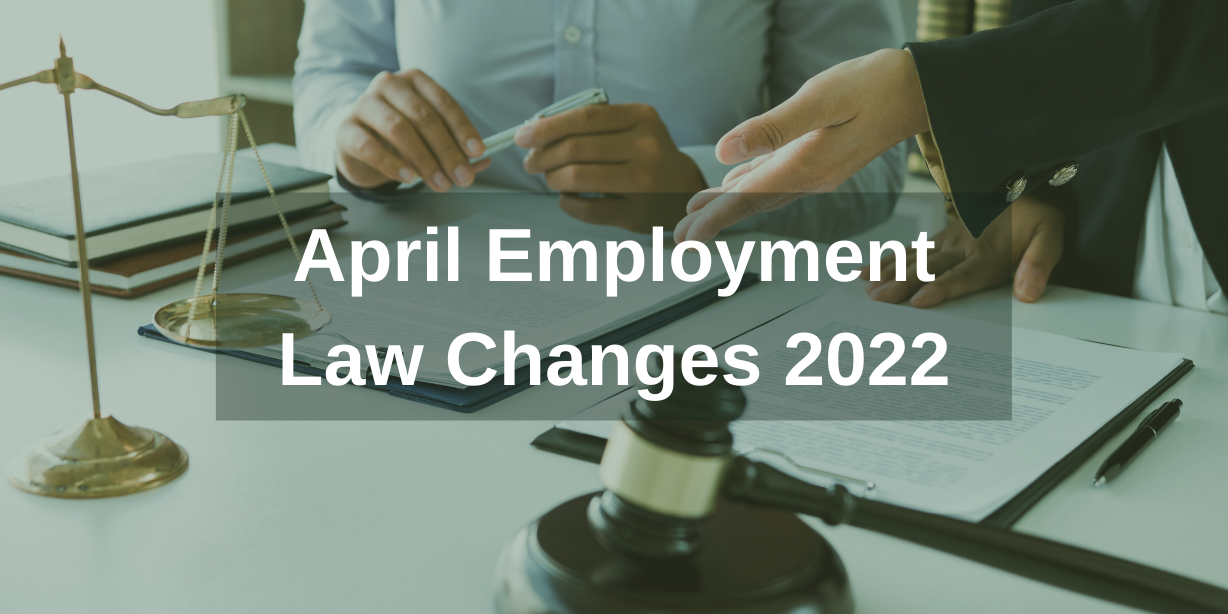April Employment Law Changes 2022
Petrol, gas, and food prices are all on the rise. The good news for employers is that the National Minimum Wage is on its way down… APRIL FOOLS. We’re sorry to say that as well as the usual increase to the National Minimum Wage there are other increases and changes to legislation that employers need to keep abreast of.
Sorry if we got your hopes up there!
🟢CONFIRMED EMPLOYMENT LAW CHANGES
Wage / Money Changes
The first employment law changes to come into force will be on 1 April 2022, where the National Minimum Wage increases to:
Over 23 £9.50 per hour
21-23 £9.18 per hour
18-20 £6.83 per hour
16-17 & Apprentice £4.81 per hour
Click here to download our free pay increase letter for all staff. You’ll need to down scroll down to “Pay Increase Letter” on the right-hand side.
From 3 April 2022, the weekly rates for statutory, maternity, adoption, paternity, shared parental and parental bereavement pay increase to;
£156.66 per week
From 6 April 2022, the weekly rate for statutory sick pay increases to:
£99.35
Also from 6 April 2022, the award limits and amounts payable as compensation in the employment tribunal increased. As well as the statutory cap on redundancy payments increasing to:
£571
Right To Work Checks
The temporary covid measures of allowing businesses to check right to work documents remotely was due to end on 6 April 2022 but has been extended to the end of September 2022.
Right-to-work checks and retaining copies of documents is something that can be confusing!
Why not give us a super quick call to check you are doing things correctly?

🟢IR35
The IR35 rules on off-payroll working is extending to the private sector on 6 April 2021.
HMRC initially allowed for a ‘light touch’ to enforcement during the first 12 months. Now that the anniversary approaches, we recommend that all businesses should review status issues as soon as possible.
The business which engages the contractor is responsible for assessing status and whether IR35 applies. If it does, the business which pays the individual is deemed to be the employer for tax and NI purposes. This could be costly from a taxation point of view but also high risk in terms of unfair dismissal claims if a worker asserts their status as an employee.
Back in 2018, Jennifer wrote a blog on the legal test to determine status and the legal principles in assessment have not changed much since.
Click here to read more.
This is a whole different area and we recommend contacting us for a free consultation. We often say “if it looks like a duck and quacks like a duck, it probably is a duck.” Let us help you to find out if your ducks are quacking or not.
🟢Vento Bands Increase
The Presidents of the Employment Tribunals in England & Wales and Scotland have issued joint Presidential Guidance updating the bands of awards for injury to feelings, also known as the Vento bands. The Vento bands are tiered levels of compensation that will be used in a range of cases but most commonly in discrimination cases.
In respect of claims presented on or after 6 April 2022, the Vento bands shall be as follows: a lower band of £990 to £9,900 (less serious cases); a middle band of £9,900 to £29,600 (cases that do not merit an award in the upper band); and an upper band of £29,600 to £49,300 (the most serious cases), with the most exceptional cases capable of exceeding £49,300.
PROPOSED CHANGES
🟡FLEXIBLE WORKING: Allowing a request as a Day 1 right.
As it stands, an employee needs 26 weeks service before they can make a formal flexible working request to amend their working pattern. The employer then has 3 months to provide an outcome. It can be a lengthy process as explained in full here.
The government is considering making it a day 1 right and reducing the length of time which an employer has to provide a decision. Employers may also be obligated to provide an alternative solution if they cannot accommodate the request. It makes sense given the seismic shift to home-based working following covid.
🟡A right to receive tips in full
We recently wrote about how there is no set legal guidance for employers in regards to the management of tips. The government is proposing to implement a statutory Code of Practice and right to request information about the value of tips for all employees.
We are all for this clarity! Read more on the current position here.
🟡Duty to protect workers from harassment
The government confirmed in July 2021 that they intend to introduce new law requiring employers to prevent sexual harassment in the workplace. This is likely to include a statutory code of practice and possibly training requirements for employers. We touch upon this in our Equality & Diversity training but stay tuned to find out more!
🟡Pregnancy Redundancy
Employees who are on maternity leave have enhanced rights when faced with a redundancy situation but pregnant women do not. There is no additional entitlement to an available job in a redundancy situation if a woman is pregnant but there is if she is on maternity leave.
The government is proposing to extend the current levels of protection to pregnant women from the date they inform the employer they are pregnant and six months after the return from maternity leave. Interesting for employers!
🟡1-week unpaid leave for unpaid carers
The government has stated that it intends to introduce a Day 1 (of employment) right for employees to take an additional week of unpaid leave per year if they are the carer of a dependant with long-term needs.
The proposal is that the employee will need to give notice and it could be postponed in certain circumstances. Stay tuned for more as it develops!
🟡Neonatal leave
Also previously proposed by government, this would be a new right for parents to take an additional week of leave for every week their baby is in neonatal care, up to a maximum of 12 weeks.
🟡Holiday Pay
We receive a lot of queries on how to calculate holiday pay for a term-time only employee. Employees in schools, nurseries, and other education establishments see this issue crop up a lot.
The legal point in question is being considered by the Supreme Court. The case was heard in November 2021 and a decision is due any time now(!).
Should a person who works irregular hours accrue 5.6 weeks leave each year and should the holiday pay be based on the average weeks pay or 12.07% of the wage or the average wage in the previous 12 or 52 weeks?
We are not afraid to state our view. We predict that the decision will be:
- 5.6 weeks leave per annum should be pro-rata’d down based on the number of weeks worked in the year; and
- The pay for annual leave should be the average weekly pay over the weeks worked in the year
Fingers crossed our prediction is correct!
🟡Termination and non-compete clauses
The proposal with possibly the biggest impact on employers is that the government has previously consulted on possible changes to post-termination non-compete clauses in employment contracts. The possibilities under consideration range from banning these clauses altogether, to requiring employers to compensate employees for the duration of the clause, similar to the position in Germany, France and Italy.
We don’t foresee a complete ban but we do expect guidance on enforceability to follow in the coming years.
🟡Right to request a predictable contract
This previous government proposal was aimed particularly at those with variable and unpredictable hours like zero hours workers, and looked at a right to request a more predictable and stable contract after 26 weeks’ service.
🟡Ethnicity Pay Gap
In April 2021 the report of the Commission on Race and Ethnic Disparities recommended that ethnicity pay gap reporting should be effective – similar to gender pay gap reporting. Nothing further has been published so stay tuned!
Let us help direct you with the new Employment Law changes
Aside from the on-going issues of implementing hybrid working and encouraging staff back to the office, there is a LOT going on for employers! It really is a difficult time to be in business and we don’t envy you. Let us help with any HR headaches. Drop us an email or call us for a quick freebie chat to clarify any of the above.
Call us on 01270 781 006





